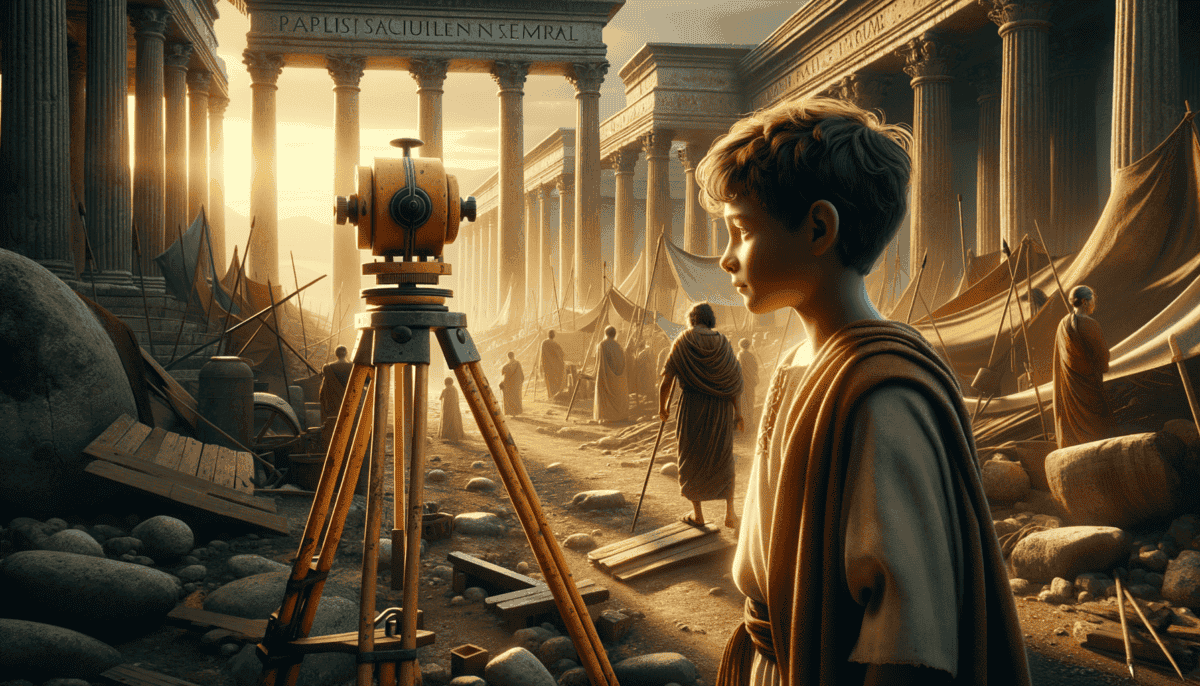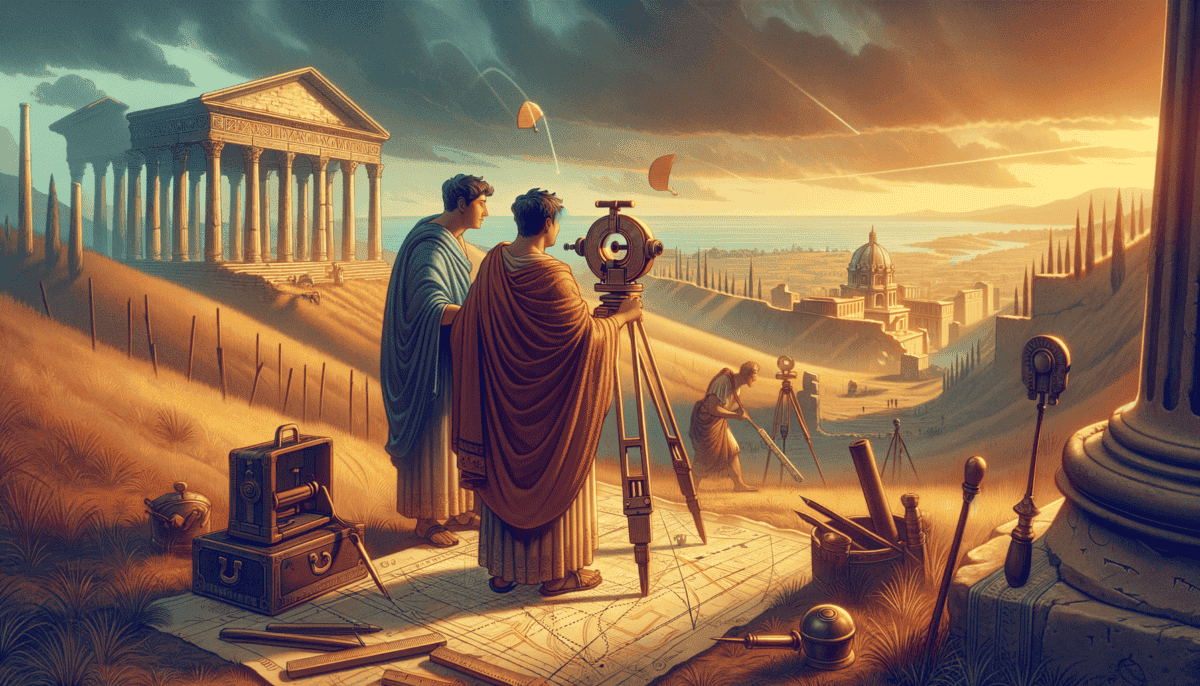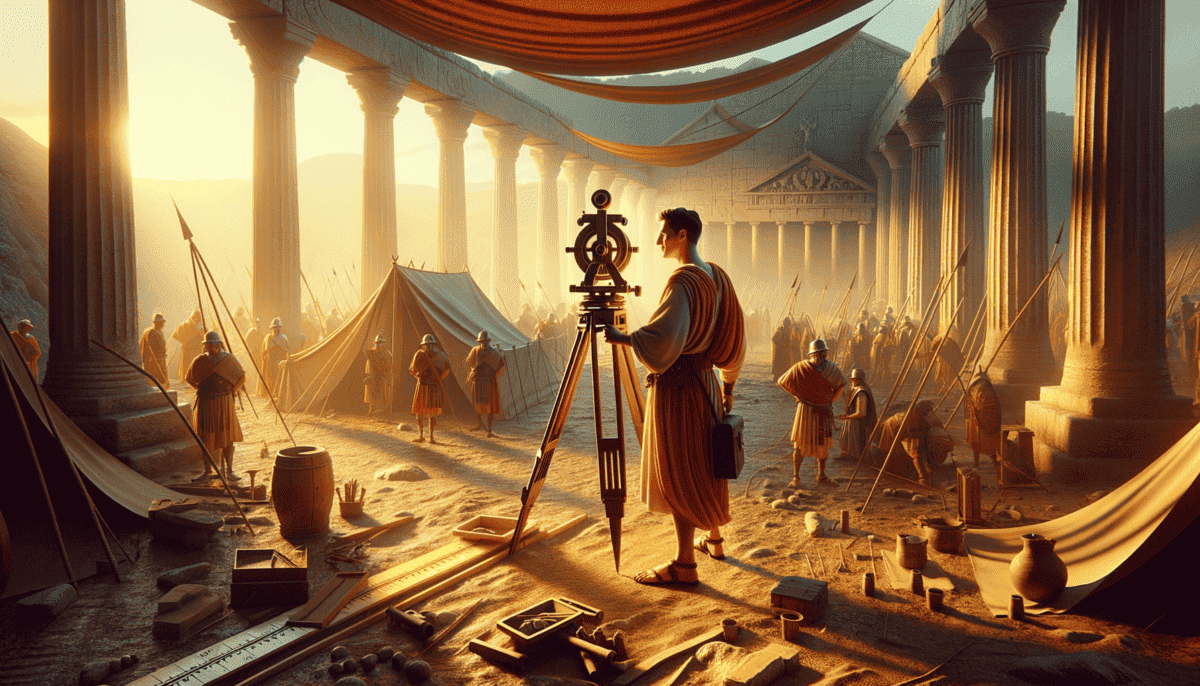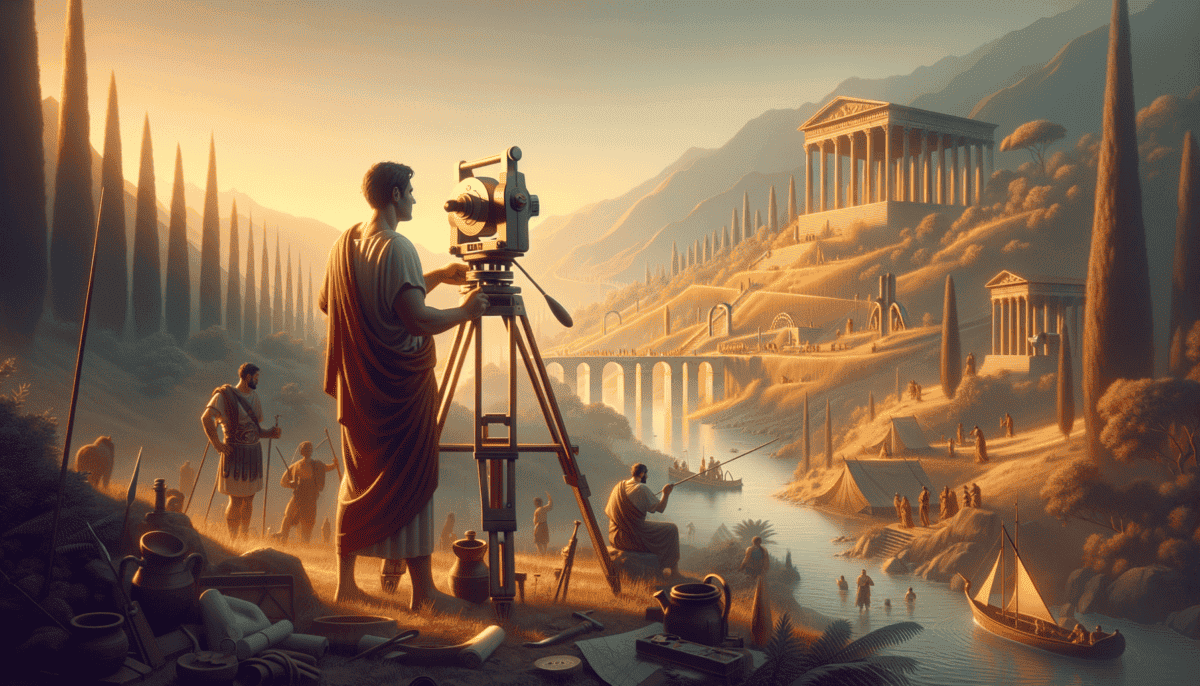The Young Apprentice
Marcus wiped sweat from his forehead as he watched his father carefully adjust the strange metal tool. The morning sun made the bronze instrument sparkle like treasure.
"What is that, Father?" Marcus asked, his eyes wide with wonder.
His father smiled and beckoned him closer. "This, my son, is a groma. It helps us draw straight lines across the land. Come see how it works."
Marcus moved closer, careful not to bump the wooden stand holding the precious tool. He was twelve years old now, old enough to start learning his family's important work. The groma looked like a cross with weights hanging from each end.
"Our family has been surveyors for three generations," his father said proudly. "We help build Rome's roads, plan cities, and mark farm boundaries. Without surveyors, Rome would not be the great empire it is today."
“A good surveyor can draw lines straighter than an arrow’s flight,” Father always said. “And straight lines make strong cities.”
Marcus watched in amazement as his father demonstrated how to use the groma. The hanging weights helped keep the lines perfectly straight. It reminded Marcus of the plumb line his mother used when hanging tapestries.
"Can I try?" Marcus asked eagerly.
His father nodded. "Careful now. Stand here and look through the crossing point. See those two stakes in the ground? We want to place a third stake in a perfectly straight line between them."
Marcus squinted through the sight line. His hands trembled slightly as he tried to line everything up. The weights swayed gently in the breeze.
"It's harder than it looks!" Marcus said with a frustrated laugh.
"All skills take practice," his father replied kindly. "I started learning when I was your age too. Now it's your turn to carry on our family's tradition."
That evening at dinner, Marcus could hardly contain his excitement as he told his mother about his first lesson.
"Did you know our measuring tools help build the whole empire?" he asked between bites of bread. "Father says surveyors are as important as soldiers!"
His mother nodded. "That's right. Roads, temples, aqueducts – they all start with careful measurements. Your grandfather helped plan the Forum in our town."
Marcus sat up straighter, proud to be part of such an important family tradition. But he still had so much to learn. The tools seemed complicated, and the math made his head spin.
"Will I ever be as good as Father?" he wondered aloud.
His father reached over and squeezed his shoulder. "With practice and patience, you'll be even better. Tomorrow we'll learn about using the rod and chord for measuring distances."
That night, Marcus dreamed of drawing perfect lines across vast landscapes. In his mind, he saw cities rising along those lines, straight roads stretching to the horizon, and mighty aqueducts carrying water to thirsty towns.
He couldn't wait for his next lesson. Being a surveyor wasn't just about measuring land – it was about helping build the greatest empire the world had ever seen. And now he would be part of that grand story.
As he drifted off to sleep, Marcus smiled. His journey to become a true Roman surveyor had finally begun. He had so much to learn, but he was ready for the challenge ahead.
Learning the Ancient Craft
The morning dew still clung to the grass as Marcus hurried to meet his new teacher. Lucius, a master surveyor who had worked across the empire, waited by the old olive tree.
“Good morning, young Marcus!” Lucius called out cheerfully. “Ready to learn the secrets of our craft?”
Marcus nodded eagerly. On a wooden table lay several mysterious tools he’d never seen before. Each one gleamed in the early sunlight.
• Groma – for making straight lines
• Dioptra – for measuring angles
• Chorobates – for checking if ground is level
• Measuring rods – for distances
• Marking stakes – to show boundaries
“First,” Lucius said, picking up a long rod, “we must learn to measure distances. Ten of these rods equal one hundred Roman feet.”
Marcus held the measuring rod carefully. “It’s so light!” he exclaimed.
“Yes, but it must be held perfectly straight,” Lucius explained. “Watch how I do it.”
The morning passed quickly as Marcus learned to use each tool. His favorite was still the groma, but the water level fascinated him too. It was just a long wooden channel filled with water.
“Water always finds its level,” Lucius explained. “Nature helps us build straight and true.”
Sometimes Marcus made mistakes. Once, his measurements were off by three feet, and they had to start over. But Lucius was patient.
“Even the finest surveyors were beginners once,” Lucius said kindly. “The key is to learn from each mistake.”
At midday, they sat under the olive tree to eat lunch. Marcus had many questions.
“How do you remember all the numbers?” he asked between bites of cheese.
Lucius smiled. “We use special tricks. Want to learn one?”
He drew in the dirt with a stick, showing Marcus how to keep track of measurements using simple marks and symbols. It was like a secret language!
In the afternoon, they practiced with the dioptra, a tool for measuring angles. It looked like a bronze disk with sights on top.
“Imagine you’re aiming at a bird,” Lucius suggested. “But instead of shooting an arrow, you’re shooting an invisible line through the air.”
That made it easier! Marcus got better at lining up the sights.
“Tomorrow,” Lucius announced as the sun began to set, “we’ll use all these tools together to lay out a practice field.”
Marcus could hardly wait. On his walk home, he noticed straight lines everywhere – in the roads, the buildings, even the rows of grape vines in the vineyard.
“The whole world is built on measurements,” he thought proudly.
That evening, his father asked about the lesson.
“Lucius says I have good eyes for straight lines,” Marcus reported happily. “And I only dropped the measuring rod twice!”
His father laughed. “Better than me – I dropped it four times on my first day!”
As Marcus lay in bed that night, his mind was full of angles, lines, and numbers. But now they weren’t scary or confusing. They were like pieces of a puzzle, waiting to be put together to build something amazing.
He thought about the new tools he’d learned to use, each one special in its own way. Tomorrow he would learn even more. Step by step, measure by measure, he was becoming a true Roman surveyor.
The Military Campaign
Marcus stepped nervously into the busy military camp. Soldiers marched past as he clutched his surveying tools. The morning air buzzed with excitement.
“Welcome to the Tenth Legion!” Commander Flavius boomed. “We need your surveying skills to build our new camp.”
Lucius put a reassuring hand on Marcus’s shoulder. “Show them what you’ve learned.”
The camp site sprawled across a grassy hill. Marcus had never worked on anything so big before!
• Straight walls
• Perfect right angles
• Level ground for tents
• Wide roads for soldiers
• Strong defensive positions
“First, we find true north,” Marcus announced, setting up his groma. His hands shook slightly, but he remembered his training.
The soldiers watched curiously as Marcus sighted along the cross pieces. The sun glinted off the plumb lines hanging from the groma’s arms.
“Every great fortress starts with a single straight line,” Lucius had taught him. ⚔️
“There!” Marcus pointed. “That’s our main road direction.”
Soldiers hammered wooden stakes where Marcus directed. Soon, straight lines began crisscrossing the hillside.
“The boy knows his work,” Commander Flavius nodded approvingly.
But then came a problem. The ground sloped sharply on one side.
“How can we build there?” a soldier asked.
Marcus took out his chorobates – the long water level. “We’ll need to dig here,” he explained, “and build up there. Then everything will be level.”
The work was hard. Marcus’s feet ached from walking back and forth. But slowly, the camp took shape.
“Look how the roads cross perfectly!” a young soldier exclaimed.
“That’s Roman engineering,” Marcus said proudly. His confidence grew with each measurement.
At sunset, Commander Flavius gathered everyone.
“Thanks to our young surveyor,” he announced, “we have a perfect camp. The enemy won’t dare attack these straight walls!”
Marcus beamed. Then Lucius spoke up. “Tomorrow, we survey the road to the next town. Ready for a bigger challenge?”
“Ready!” Marcus grinned. He wasn’t just learning anymore – he was doing real work for Rome!
That night, Marcus sat by the campfire with the soldiers. They shared stories about building roads and bridges across the empire.
“Without surveyors,” one old soldier said, “we’d be lost in the wilderness. You help us bring Roman order to wild places.”
Marcus looked up at the stars. The same stars helped guide his measurements, just as they guided Rome’s armies.
He thought about the straight lines and perfect angles of the camp. His work would help keep these soldiers safe.
Tomorrow would bring new challenges. But now Marcus knew he could handle them. One careful measurement at a time, he was helping build the mighty Roman Empire.
Mapping New Territories
The morning sun cast long shadows as Marcus and the survey team climbed the steep hillside. They were far from Rome now, in a wild new land.
“Be careful with that groma,” Lucius called out. “The terrain here is nothing like home.”
Marcus nodded, gripping his surveying tool tightly. Rocks shifted under his feet as he climbed.
• Rocky mountains
• Dense forests
• Swift rivers
• Hidden valleys
• Local tribes who weren’t friendly
“Stop!” Marcus suddenly shouted. He pointed to a deep crack in the ground ahead. “We can’t measure straight through there.”
The soldiers looked worried. They needed an accurate map of this area for Rome’s new road.
“Think, Marcus,” Lucius encouraged. “What would a true surveyor do?”
“Sometimes the shortest path isn’t the best path,” Marcus remembered.
“We’ll make a triangle!” Marcus announced. He set up his groma on solid ground. “If we measure around the crack, we can calculate the distance across it.”
Lucius smiled proudly. The soldiers looked impressed.
But then they heard shouting. Local tribesmen appeared on the ridge above!
“Quick, pack up the tools!” Commander Flavius ordered. “We must protect our measurements!”
Marcus carefully wrapped his groma. These measurements would help Rome build roads and towns here someday. They had to save them!
The team retreated to their camp. That night, Marcus helped draw the first proper map of the area.
“See how the valley curves here?” he showed Commander Flavius. “We can build the road along this natural path.”
“Excellent work,” the Commander nodded. “You’re thinking like a true Roman surveyor now.”
Over the next weeks, Marcus led the team through forests and around mountains. Each day brought new problems to solve.
“The river’s too wide to measure across,” a soldier complained one day.
“Watch this,” Marcus said. He used his groma to sight angles from two different spots. “Now we know how wide it is without crossing!”
Even the older surveyors started asking for Marcus’s ideas. He had learned to think differently about each challenge.
One evening, Lucius found Marcus studying his maps by candlelight.
“You’ve grown much since we left Rome,” Lucius said softly. “These lands aren’t so wild anymore, thanks to your measurements.”
Marcus traced the careful lines on his map. Each one represented a real place he had surveyed.
“Tomorrow we start planning the aqueduct,” Lucius announced. “Ready for your biggest project yet?”
Marcus grinned. He was more than ready – he was excited! His maps would help bring water to this new Roman town.
As he rolled up his scrolls, Marcus thought about how far he’d come. He wasn’t just learning anymore. He was creating new knowledge, mapping unknown lands for Rome. ️
The Great Aqueduct Project
Marcus stood at the edge of a cliff, squinting at the distant mountains. The morning breeze ruffled his scrolls as he studied his maps. ️
“Water must flow downhill all the way to the new town,” he explained to his team. “But it can’t flow too fast or too slow.”
• Find the perfect path for water
• Measure the slopes carefully
• Plan where to build arches
• Keep the water flowing just right
• Finish before winter comes
“Impossible!” grumbled Cassius, the old engineer. “You’re too young to lead this project.”
Marcus took a deep breath. “Watch this,” he said calmly. He set up his groma and began taking measurements.
“Water always finds its path,” Marcus remembered Lucius saying. “We just need to help it along.”
Hour after hour, Marcus and his team measured the land. The sun beat down hot, but they didn’t stop.
“Look here!” Marcus called excitedly. He pointed to a natural valley. “We can use these hills to support the water channel!”
Even Cassius looked impressed. “Clever boy,” he muttered.
But then they found a huge problem. A wide gap between two cliffs blocked their path!
“We’ll need to build the biggest bridge-arch ever seen,” Cassius declared. “It’s too risky.”
Marcus studied his measurements carefully. “Not a bridge,” he said slowly. “Something better.”
He grabbed a fresh scroll and began drawing. His plan showed three levels of arches, each one supporting the next.
“It will work,” Marcus explained. “I calculated everything three times.”
The workers began building. Day after day, the arches grew taller. Marcus checked every stone, every angle.
“The water must flow at exactly the right slope,” he told the workers. “One small mistake could ruin everything.”
One morning, dark clouds filled the sky. ⛈️
“A storm is coming!” someone shouted. “The mortar hasn’t dried yet!”
Marcus acted fast. “Cover the fresh stonework!” he ordered. “We can’t let the rain wash away our work!”
The team worked through the storm, protecting their project. Water dripped down Marcus’s face as he held tarps in place.
Finally, after many weeks, the aqueduct was ready. Marcus stood proudly beside his creation.
“Time to test it,” Cassius announced. Everyone held their breath as the water was released.
Slowly, carefully, the water flowed along Marcus’s perfect path. It crossed the giant arches and continued toward town.
“You did it!” Lucius cheered. “The youngest surveyor to ever build an aqueduct!”
Even Cassius smiled. “I was wrong about you,” he admitted. “You understand water and stone better than most grown men.”
That evening, Marcus watched the sunset reflect off his aqueduct. The water flowed steady and true, just as he had planned.
“What’s next?” Lucius asked, joining him.
Marcus grinned. “I heard they need surveyors for a new project in Britain…”
Legacy of the Lines
The salty breeze swept across Marcus’s face as his ship approached the shores of Britain. At sixteen, he was no longer the uncertain boy who first held a groma.
“Land ho!” called the lookout. Marcus smiled, remembering his journey from apprentice to master surveyor.
“Every line we draw shapes the future,” he whispered, echoing Lucius’s words from years ago.
As the ship docked, a group of officials waited on the shore. Among them stood Flavius, the governor’s chief engineer.
“Welcome to Britain, Marcus!” Flavius boomed. “We’ve heard tales of your aqueduct. Now we need your help with something bigger.”
• Map the entire northern frontier
• Plan new roads and settlements
• Mark boundaries for farms
• Design defensive walls
• Connect everything together
“This is why I came,” Marcus replied confidently. He pulled out his trusted surveying tools.
Over the next few weeks, Marcus led teams across the rugged landscape. They measured hills, valleys, and forests.
“See how the land tells us where to build?” he explained to his new apprentice, Julia. “Just like water finds its path.”
Julia’s eyes sparkled with curiosity, reminding Marcus of himself not so long ago.
“But how do you know where to start?” she asked.
Marcus drew lines in the dirt. “Every great city begins with simple marks like these. Watch closely…”
He demonstrated the techniques Lucius had taught him, now made better by his own discoveries. Julia took careful notes.
“Your methods are different,” Flavius observed. “More precise than the old ways.”
Marcus nodded. “I learned from the best, then found ways to improve.”
One morning, as they surveyed a hillside, Julia made an exciting discovery.
“Look!” she exclaimed. “This valley would be perfect for a new town!”
Marcus beamed with pride. His student was learning fast, just as he had.
“Tomorrow’s surveyors will do even better than us,” he told Flavius. “They’ll build things we can’t even imagine.”
As the weeks turned to months, Marcus’s maps helped create a new Roman province. Roads stretched across the land, connecting new towns and farms. ️
One evening, sitting by a campfire, Marcus wrote a letter to Lucius:
“Dear Teacher,
Remember when I first picked up the groma? Now I’m teaching others. Your lessons built more than roads and towns – they built futures. Every straight line, every careful measurement helps create something lasting. Thank you for showing me the way.”
Standing on a hilltop, Marcus watched workers build a road using his measurements. Julia stood beside him, already showing the makings of a great surveyor.
“Our lines will last hundreds of years,” she said proudly.
Marcus smiled. “Thousands,” he corrected. “Long after we’re gone, these roads will guide travelers. Our measurements will help new cities grow.”
The setting sun cast long shadows across their measuring lines in the dirt. Marcus thought about all the young surveyors who would follow, drawing their own lines across new lands.
“The empire grows stronger with every measurement we take,” Flavius declared.
“No,” Marcus replied softly. “It grows stronger with every lesson we share, every skill we pass on. That’s the real power of what we do.”
As stars appeared overhead, Marcus pulled out his old wooden groma. He handed it to Julia with a smile.
“Your turn to make history,” he said. “Just remember – it all starts with a single straight line.” ⭐






